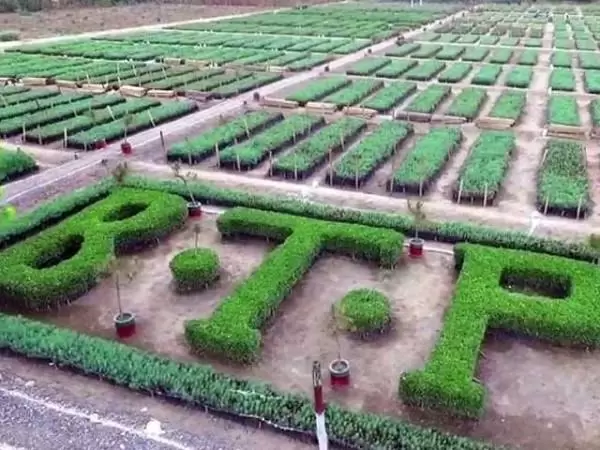
Khyber Pakhtunkhwa's forests are crucial in combating climate change. They absorb nearly 50% of Pakistan’s carbon emissions. The province's forest cover covers 37% of its total land area or approximately 37,000 square kilometers.
Speaking at the "Breathe Pakistan" International Climate Change Conference, organized by Dawn Media Group on February 6-7 in Islamabad, Chief Minister of Khyber Pakhtunkhwa, Ali Amin Gandapur, highlighted the province’s importance in addressing climate change. He stated that the province requires an annual budget of Rs 322 billion to protect its forests. He also emphasized the efforts of former Prime Minister Imran Khan, who has raised awareness about climate change at both national and international levels.
Gandapur further revealed that KP has invested Rs 675 billion in forest conservation and expansion since 2017, increasing its forest cover to 26% of its total land area, exceeding international standards. The province’s forest reserves hold immense potential for mineral extraction and agriculture, but instead of exploiting these resources, KP is prioritizing environmental conservation. He claimed that the province’s carbon credits are valued at approximately Rs 100 billion annually.
Also Read: Blind Faith and the Price of Ignorance: A Reflection on ‘Tan Man Neel o Neel’
Additionally, he announced that 661 government schools, 183 colleges, and 628 mosques in KP have been shifted to solar energy this year, with plans to extend this initiative to all educational institutions, healthcare centers, and government buildings to reduce carbon emissions.
Dr. Muhammad Nafees, Chairman of the Environmental Science Department at the University of Peshawar, explained the significance of afforestation in mitigating climate change. He stated that trees absorb sunlight, convert it into food for all living beings, and filter carbon dioxide from the air while releasing oxygen. Without food and oxygen, life on Earth would be impossible.
Dr. Nafees elaborated on trees' multiple benefits, including their ability to provide wood, medicine, paper, furniture, and construction materials. They also stabilize temperatures, store water, and prevent soil erosion.
However, he noted that the Ten Billion Tree Tsunami project, though promising, was not implemented as initially planned. He pointed out several flaws, such as:
Despite these shortcomings, the project raised public awareness about afforestation, and many citizens began actively participating in tree-planting efforts, contributing to climate change mitigation.
Dr. Nafees emphasized the crucial role of trees in maintaining biodiversity. He explained that trees form the foundation of ecosystems, providing food, shelter, and protection from extreme weather and predators.
He warned that climate change and environmental pollution disrupt ecosystems, leading to an imbalance in species composition and biochemical processes. Research conducted in 2021 revealed that climate change could result in the extinction of 50% of plant and animal species on Earth.
Historically, global extinction rates have accelerated:
To preserve natural ecosystems, immediate measures are required to protect forests and maintain ecological balance.
Environmental experts emphasize that trees absorb carbon dioxide from the atmosphere and release oxygen, playing a critical role in reducing global warming.
Currently, atmospheric carbon dioxide is absorbed as follows:
While large-scale afforestation helps combat climate change, trees alone cannot fully counteract carbon emissions. Experts argue that there isn’t enough land available to plant the number of trees required to remove the remaining 45% of carbon dioxide.
Even with aggressive afforestation efforts, the absorption rate may increase from 30% to 35%, but reaching 75% absorption is nearly impossible. Therefore, alternative carbon capture technologies and emission reduction strategies must be explored.
Environmental journalist Manzoor Ali, based in Peshawar, told TNN that the forests of Malakand and Hazara divisions are among the greenest regions in Pakistan. These forests alone absorb 50% of the country’s carbon emissions.
Ali stressed the importance of both planting new trees and protecting existing forests. He condemned the unnecessary felling of mature trees, stating that historical trees from the British colonial era still exist in Peshawar, benefiting both humanity and biodiversity. However, he lamented that the once-green city of Peshawar is transforming into a concrete jungle.
The Billion Tree Tsunami project was initiated in 2014 by the KP government, planting one billion trees across 35,000 hectares of barren land and forests. Initially a provincial initiative, the project gained national and global recognition, becoming part of international environmental agendas such as those of the World Bank and IUCN.
While Chief Minister Ali Amin Gandapur’s claims of success will be tested over time, environmental experts agree that afforestation alone cannot solve the climate crisis. To address the situation effectively, a fundamental shift in development policies and resource management is essential. Experts stress that sustainable human development must align with environmental conservation, requiring a change in societal attitudes toward natural resource consumption.